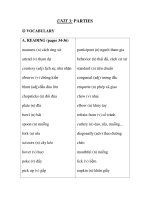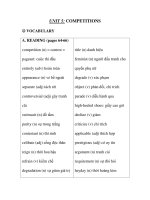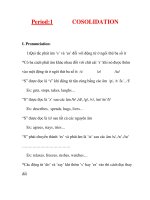Giáo án Tiếng anh lớp 11 - UNIT 1: FRIENDSHIP - Phần 1 pot
Bạn đang xem bản rút gọn của tài liệu. Xem và tải ngay bản đầy đủ của tài liệu tại đây (141.86 KB, 9 trang )
UNIT 1: FRIENDSHIP
VOCABULARY
A. READING (pages 14-16)
remind (v) nhắc lại
opinion (n) quan điểm, ý kiến
pack up (v) thu dọn
stuffed animal (n) thú nhồi bông
stuff (n) đồ đạc
satisfaction (n) sự hài lòng,thỏa
mãn
break out into tears (v) phát
khóc
thick and thin (idiom): good and
bad times
loser (n) người thua cuộc
cheat (v) lừa đảo
confide (v) tin cậy, tín nhiệm
detention (n) hình phạt giữ lại
trường sau giờ học
guarantee (n) sự bảo đảm
psychological (adj) thuộc tâm lí
depression (n) sự trầm cảm
anxiety (n) sự lo lắng
evolve (v) = develop: phát triển
distant (adj) xa cách
focus (v) tập trung
emphathize (v) thông cảm
unsociable (adj) khó gần
scold (v) rầy la, mắng
B. LISTENING (page 17)
athletic (adj) có vẻ thể thao
reserved (adj) kín đáo
enthusiastic (adj) nhiệt tình,hăng
hái
stout (adj) to khoẻ
practical (adj) thực tế
skinny (adj) gầy nhom
sensitive (adj) nhạy cảm
dynamic (adj) năng động
punctual (adj) đúng giờ
conservative (adj) bảo thủ
sympathetic (adj) thông cảm
indifferent (adj) bàng quan
costume (n) trang phục
curious (adj) tò mò
plump face (n) mặt phúng phính
dimple (n) lúm đồng tiền
casual (adj) bình thường
C. SPEAKING (pages 18-19)
multi-school: gồm nhiều trường
tasty (adj) ngon
cousin (n) anh (chị) em họ
D. WRITING (pages 20-21)
narrative (n) bài tường thuật
vicious (adj) xấu xa
timid (adj) rụt rè
imbecile (adj) khờ dại
criticize (v) phê bình
confess (v) thú nhận
amount (v) lên đến
giggle (v) cười rút rích
mood (n) tâm trạng
guy (n) bạn trai (thân mật)
fascinate (v) thu hút
decisive (adj) quyết đoán
strategy (n) chiến lược
E. LANGUAGE FOCUS
(p.21-23)
responsible (adj) có trách nhiệm
honest (adj) trung thực
devoted (adj) cống hiến
prosperous (adj) thành đạt
collision (n) sự đụng xe
persistent (adj) kiên trì
piercing (adj) lanh lảnh
bushy(adj) có nhiều bụi cây,rậm
rạp
snake (n) con rắn
stick (n) que củi
utter (v) phát ra
phobia (n) nỗi sợ hãi
fatal (adj) tai hại
submarine (n) tàu ngầm
collapsible (adj) có thể gấp gọn
ragged (adj) rách rưới
screaming (adj) la lên, thét lên
authority (n) chính quyền
cloud (n) đám mây
sour guava (n) ổi chua
thunder (n) sấm
scared (adj) sợ hải
unconscious (adj) không nhận
thức
WORD STUDY
Descriptive Adjectives
1. Vị trí của tính từ:
a/ Đứng trước danh từ
Ex: My best friend is a responsible and honest girl.
b/ Đứng sau các động từ như: be, become, look, get, seem,
appear
Ex: Na is both sociable and kind.
2. Thứ tự của tính từ:
opinion (quan điểm) + size (hích tước + quality (tính chất) +
age (tuổi) + shape (hình dáng) + color (màu sắc) + participle form
(phân từ dùng như tính từ: V-ing/ V-ed) + origin (nguồn gốc) +
material (vật liệu) + type (loại) + purpose (mục đích).
Ex: I have an old wooden table.
GRAMMAR
A. Verb Form
I. The Present Simple Tense
1. Form S + V1(s/es)….
2. Use
a. Diễn tả một hành động hoặc một thói quen ở hiện tại (always,
usually, often, sometimes, occasionally, seldom, rarely,
every…….)
Ex: I usually go to school in the afternoon.
b. Diễn tả một chân lí, một sự thật lúc nào cũng đúng.
Ex: The earth moves around the sun.
3. Đối với ngôi thứ ba số ít: He, She, It.
a.Thêm “S” vào sau động từ thường.
Ex: Lan often gets up early in the morning.
b.Thêm “ES” vào sau các động từ tận cùng là: ch, sh, s, x, o, z.
Ex: He watches a lot of TV on Sundays.
II. The Present Progressive Tense
1. Form S + am/is/are + V-ing…
2. Use
Diễn tả một hành động đang xảy ra trong lúc nói (now, at the
moment, at this time, at present….)
Ex: - I am looking for the latest newspaper now.
- They are watching a sport game show at the moment.
3. Note: Một số động từ không dùng ở thì Present Progressive,
mà chỉ dùng ở thì Present Simple: to be, to want, to need, to have
(có), to know, to understand, to seem …
Ex: - We are tenth-grade students now.
- I understand the lesson at the moment.
III. The Present Perfect Tense
1. Form S + has/have +V3/ed…
2. Use
a. Diễn tả một hành động xảy ra trong quá khứ và kéo dài đến
hiện tại (never, ever, not…yet, since, for, so far, until now, up to
now,…….)
Ex: We have learnt English for 5 years.
b. Diễn tả một hành động vừa mới xảy ra (just, recently, lately).
Ex: She has just gone out.
c. Diễn tả một hành động xảy ra trong quá khứ không xác định
rõ thời gian (already, before)
Ex: Have you seen this movie before?
3. Notes:
a/ This is the …… time + S + has/have + V3/ed….
Ex: This is the first time I have studied in this school.
b/ S + has/have +V3/ed…… since + S + V2/ed….
Ex: We have known each other since we worked in that factory.
IV. The Past Simple Tense
1. Form S + V2/ed…
2. Use
a. Diễn tả một hành động xảy ra trong quá khứ xác định rõ thời
gian (yesterday, ago, last……, in the past, in 1990)
Ex: - My father bought this house 10 years ago.
- Mr. Nam worked here in 1999.
b. Diễn tả một loạt các hành động xảy ra liên tiếp trong quá
khứ.
Ex: - Last night, I had dinner, did my homework, watched TV
and went to bed.
- When she came here in 1990, she worked as a teacher.
V. The Past Progessive Tense
1. Form S + was/were + V-ing
2. Use
a. Diễn ta một hành động xảy ra vào một thời điểm xác định
trong quá khứ.
Ex: She was studying her lesson at 7 oclock last night.
b. Diễn tả một hành động đang xảy ra ở quá khứ (was/ were +
V-ing) thì có một hành động khác xen vào (V2/ed).
Ex: - He was sleeping when I came.
- While my mother was cooking dinner, the phone rang.
c. Diễn tả hai hành động đang xảy ra song song cùng lúc trong
quá khứ.
Ex: While I was doing my homework, my younger brother was
playing video games.
VI. The Past Perfect Tense
1. Form S + had + V3/ed…
2. Use
a. Diễn tả một hành động xảy ra trước một thời điểm trong quá
khứ.
Ex: By the end of last month, she had made 4 shirts.
b. Diễn tả một hành động xảy ra và hoàn thành trước một hành
động khác trong quá khứ (before, after, by the time). Hành động
xảy ra trước dùng thì Past Perfect, hành động xảy ra sau dùng thì
Past Simple.
Ex: - After Nam had done his homework, he went to bed.
- They had lived in Dong Thap before they moved to HCM
city.
B. Linking Words
Các từ liên kết như: and, or, but, either or , neither nor
1. Dùng để liên kết hai danh từ.
Ex: Either you or Nam goes to the store.
2. Dùng để liên kết hai cụm từ.
Ex: He likes playing soccer and collecting stamps.
3. Dùng để liên kết hai câu.
Ex: My father bought a new motorbike, but we all didn’t like it.









